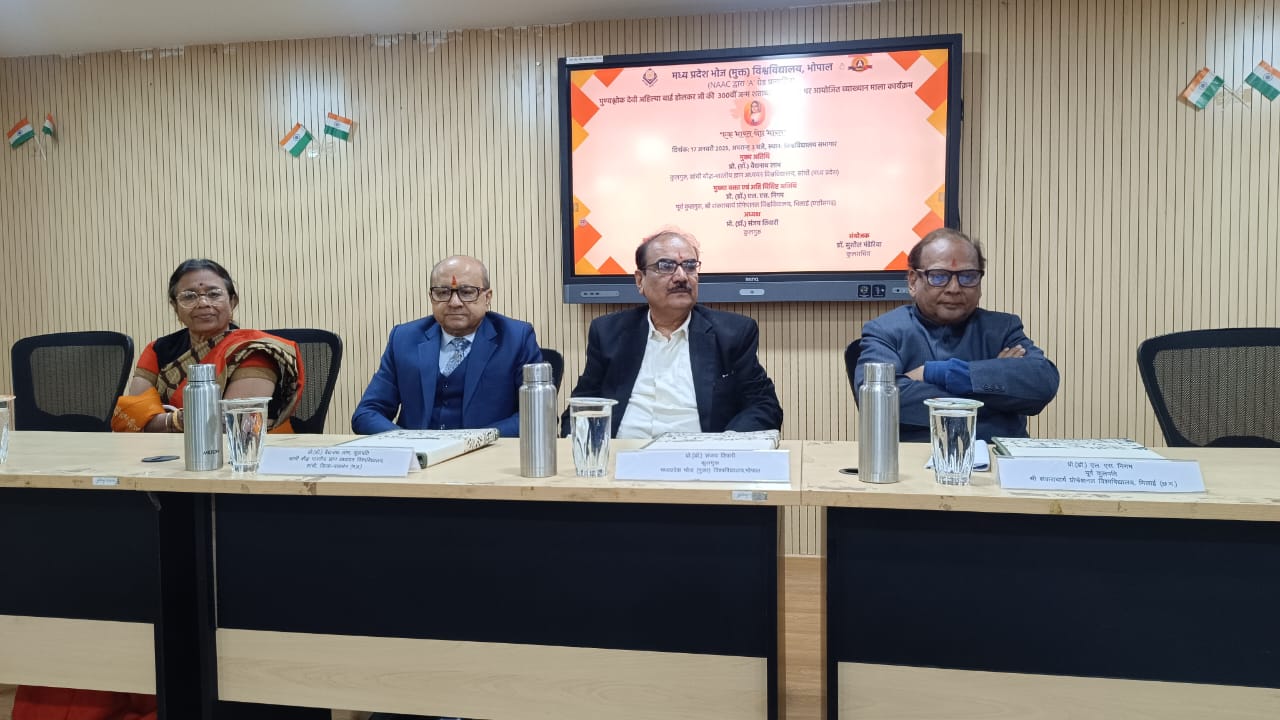CNN Central News & Network–ITDC India Epress/ITDC News Bhopal: On the occasion of the 300th birth anniversary of Devi Ahilyabai Holkar, a lecture program on the theme “Ek Bharat Shreshtha Bharat” was organized in the auditorium of Madhya Pradesh Bhoj Open University.
The keynote speaker, L.S. Nigam, former Vice-Chancellor of Shankaracharya Professional University, Bhilai, Chhattisgarh, highlighted Devi Ahilyabai’s significant contributions to the restoration of Shiva temples and her pivotal role in fostering India’s cultural unity. Prof. Nigam elaborated on the framework of Ek Bharat Shreshtha Bharat and discussed India’s ancient traditions. Referring to the Rigveda, he spoke about the seven major rivers mentioned, including Saraswati, Sindhu, Sutlej, Beas, Ravi, and Chenab, which formed the heart of Aryan civilization. The Rigveda also mentions the battle of ten kings, all from Aryan tribes. During the post-Vedic period, the region from the Himalayas to the Vindhyas was known as Aryavarta. It is said that Sage Agastya extended Aryan culture to Dakshinapath (southern India), integrating both northern and southern India. Buddhist history also mentions the existence of 16 Mahajanapadas. Prof. Nigam emphasized the significance of people and regions in Indian history, reflected in the Constitution, with phrases like “We, the people of India” and “India, that is Bharat.”
He explained that the word India originates from the Greek term for the Sindhu River, called the Indus. India’s diversity, he remarked, resembles a beautiful garden, with six ethnic groups residing here. Groups such as Greeks, Shakas, Huns, and Kushans came to India and merged into Indian culture. From a linguistic perspective, India has two major language families: Indo-Aryan and Dravidian.
He noted India’s rich philosophical heritage, encompassing nine schools of thought—three heterodox and six orthodox. While the concept of the nation-state emerged later, India has always been a cultural, spiritual, and religious nation. Prof. Nigam remarked that Indian philosophy began with the Aranyakas, leading to the Upanishads and the Bhagavad Gita. This Aranyaka-based culture is the source of India’s diversity. He also emphasized that India is a union of states, with states forming the country’s borders and being integral parts of the nation. Citizenship, a common Constitution, and one flag unite India as a single nation. He concluded by stressing the need to preserve India’s cultural, spiritual, and philosophical heritage.
The chief guest, Vaidyanath Labh, Vice-Chancellor of Sanchi University of Buddhist-Indic Studies, highlighted that India is an ancient nation—a cultural entity distinct from mere geographic boundaries, which shift over time. He pointed out that new historical research is dispelling old misconceptions. Ancient centers of learning such as Nalanda, Udantpuri, Vikramshila, Somapura, Vallabhi, and Kanchipuram were key hubs of knowledge. Shankaracharya’s establishment of four monasteries across India symbolizes India’s cultural unity. Prof. Labh also recalled the efforts of Sardar Vallabhbhai Patel, who unified 565 princely states to form one political entity. He emphasized that while India was politically divided at times, culturally it has always been one nation. He encouraged everyone to take pride in India’s glorious history.
Presiding over the program, Sanjay Tiwari, Vice-Chancellor of Madhya Pradesh Bhoj Open University, stated that history is created by those who remember it. While civilizations rise and fall, culture endures. Recalling Devi Ahilyabai Holkar, he described her as a skilled administrator, strategist, and welfare-oriented leader who maintained direct communication with the people.
Dr. Anita Kaushal, Deputy Director of the University’s Internal Quality Assurance Cell, introduced the topic. The program was coordinated by senior advisor Nidhi Rawal Gautam, while the vote of thanks was delivered by Uttam Singh Chauhan, Dean of Arts and Humanities. The event witnessed a large gathering of eminent scholars, university officials, staff, and faculty members from Bhopal.
#DeviAhilyabaiHolkar #300thAnniversary #IndianHistory







